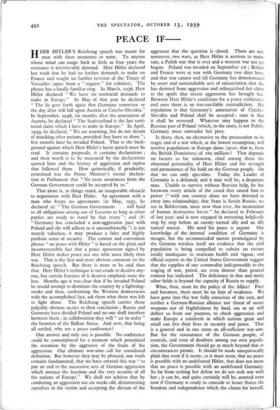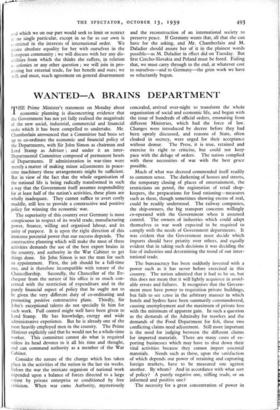PEACE IF
HERR HITLER'S Reichstag speech was meant for men with short memories or none. To anyone whose mind can range back as little as four years the utterance is irretrievably damned. Herr Hitler declared last week that he had no further demands to make on France and sought no further revision of the Treaty of Versailles (apart from a " request " for colonies). The phrase has a fatally familiar ring. In March, 1936, Herr Hitler declared " We have no territorial demands to make in Europe." In May of that year he declared " The lie goes forth again that Germany tomorrow or the day after will fall upon Austria or Czecho-Slovakia." In September, 1938, six months after the annexation of Austria, he declared " The Sudetenland is the last terri- torial claim which I have to make in Europe." In April, 1939, he declared, " We are rearming, but do not dream of attacking other nations, provided they leave us alone "; five months later he invaded Poland. That is the back- ground against which Herr Hitler's latest speech must be read. It contains proposals, it contains declarations ; and their worth is to be measured by the declarations quoted here and the history of aggression and rapine that followed them. How quixotically, if prudently, restrained was the Prime Minister's recent declara- tion in Parliament that " No mere assurances from the German Government could be accepted by us."
That alone is, as things stand, an insuperable obstacle to negotiation with Herr Hitler. An agreement with a man who keeps no agreements (in May, 1935, he declared (a) " The German Government . . . will hold to all obligations arising out of Locarno so long as other parties are ready to stand by that treaty "; and (b) " Germany has concluded a non-aggression pact with Poland and she will adhere to it unconditionally ") is not merely valueless, it may produce a false and highly perilous sense of security. The current and convenient phrase " no peace with Hider " is based on the plain and incontrovertible fact that a peace agreement signed by Herr Hitler makes peace not one whit more likely than war. That is the first and most obvious comment on the Reichstag speech. But there is more to be said than that. Herr Hitler's technique is too crude to deceive any- one, but certain features of it deserve emphasis none the less. Months ago it was clear that if he invaded Poland he would attempt to dominate the country by a lightning- stroke and then, confronting the Western democracies with the accomplished fact, ask them what there was left to fight about. The Reichstag speech carries those palpably obvious tactics to their conclusion ; Russia and Germany have divided Poland and no one shall interfere between them ; in collaboration they will " set in order " the frontiers of the Balkan States. And now, that being all settled, why not a peace conference?
One answer and only one is possible. No conference could be contemplated for a moment which postulated the retention by the aggressor of the fruits of his aggression. Our ultimate war-aims call for considered definition. But however they may be phrased, one truth remains fundamental, that we have entered this war " to put an end to the successive.acts of German aggression which menace the freedom and the very security of all the nations of Europe." We shall not achieve that by condoning an aggression not six weeks old, disinteresting ourselves in the victim and accepting the dictum of the aggressor that the question is closed. There are not, moreover, two wars, as Herr Hitler is anxious to main- tain, a Polish war that is over and a western war not yet begun. Poland was invaded on September 1st ; Britain and France were at war with Germany two days later, and that war cannot end till Germany has demonstrated by overt and unmistakable acts of renunciation that she has desisted from aggression and relinquished her claim to the spoils that recent aggression has brought her. Between Herr Hitler's conditions for a peace conference and ours there is an irreconcilable contradiction. His stipulation is that Germany's annexation of Czecho- Slovakia and Poland shall be accepted ; ours is that it shall be reversed. Whatever may happen to the Russian part of Poland (which, in the main, is not Polish) Germany must surrender her prey.
Is there, then, no alternative to the prosecution to its tragic end of a war which, at the lowest assumption, will involve populations in Europe alone (apart, that is, from the British Dominions) of 16o millions? That depends on factors so far unknown, chief among them the abnormal personality of Herr Hitler and the strength and permanence of his hold on the German people. On that we can only speculate. Today the Leader of Germany is a defeated, and it may well be, a desperate man. Unable to survive without Russian help, he has forsworn every article of the creed that raised him to power (" with one country alone we have detested to enter into relationships; that State is Soviet Russia; we see in Bolshevism, more now than ever, the incarnation of human destructive forces " he declared in February of last year) and is now engaged in retreating helplessly step by step before an enemy turned ally and an ally turned master. His need for peace is urgent. Our knowledge of the internal condition of Germany is meagre, but the recommended menus promulgated by the German wireless itself are evidence that the civil population is being compelled to subsist on rations totally inadequate to maintain health and vigour, and official reports to the United States Government suggest that the supplies of one commodity indispensable to the waging of war, petrol, are even shorter than general rumour has indicated. The deficiency in that and many other fields is beyond the capacity of Russia to supply.
What, then, must be the policy of the Allies? First and foremost, there must be no hint of weakness. We have gone into this war fully conscious of the cost, and neither a German-Russian alliance nor threat of secret weapons nor of frightfulness by land, sea or air will deflect us from our purpose, to check aggression and make Europe a continent in which nations great and small can live their lives in security and peace. That is a general and in one sense an all-sufficient war-aim. But for the reassurance of the German people, of neutrals, and even of doubters among our own popula- tion, the Government should go as much beyond that as circumstances permit. It should be made unequivocally plain that even if it seems, as it must seem, that no peace is possible with an undefeated Hider, that does not mean that no peace is possible with an undefeated Germany. So far from seeking her defeat we do not seek war with her ; it can be, and quite certainly will be, averted even now if Germany is ready to concede to lesser States the freedom and independence which she claims for herself, and which we on our part would seek to limit or restrict in no single particular, except in so far as our own is r,:stricted in the interests of international order. We desire absolute equality for her with ourselves in the European community ; we will discuss with her any dis- abilities from which she thinks she suffers, in relation t' colonies or any other question ; we will join in pro- moting her external trade, for her benefit and ours; we will, and must, reach agreement on general disarmament
and the reconstruction of an international society to preserve peace. If Germany wants that, all that she can have for the asking, and Mr. Chamberlain and M. Daladier should assure her of it in the plainest words possible—as M. Daladier in effect did on Tuesday. But first Czecho-Slovakia and Poland must be freed. Failing that, we must carry through to the end, at whatever cost to ourselves—and to Germany—the grim work we have so reluctantly begun.











































 Previous page
Previous page